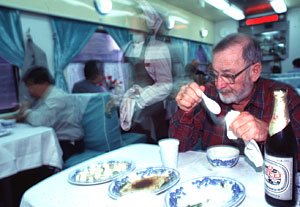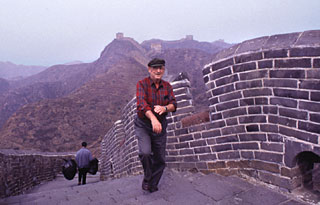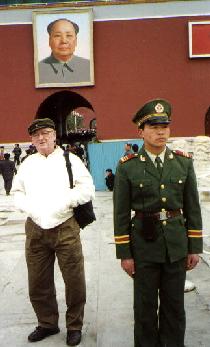Father and Son Reunion --- by Rail
Funny things happen when trains roll, as the author discovered on a
long-distance trek of discovery, from Hong Kong to Beijing....
with father on board
By Ron Gluckman /Hong Kong to Beijing
"A
RE YOU CRAZY?" THAT'S THE UNIFORM reaction of friends when I tell them I'm planning to travel from Hong Kong to Beijing by train. Even those who know that I'm a romantic when it comes to railroads. Oh, I'm no train spotter, but I've ridden rails across Russia, into the cold heartland of Alaska, and whenever they still run in Central and South America. Overheated iron horses in China and India, rolling wrecks in Burma, Java and Mongolia. Others may gasp, but I clamber on board.Still, friends say I'm crazy to even consider this relatively short trip. Why? Because this time my father is along for the ride.
Dad is nearly 70, in good health. But is he game for the Beijing train? The closest he's come to China is the sweet and sour chicken in a California restaurant. Like the rest of the family, he's never visited Asia, my home for nine years. But it's too late for second thoughts now. The whistle blows, the doors slam shut, and the train begins its slow, seductive roll. Soon Hong Kong's urban sprawl gives way to greenery and open space. Ahead lies the enormous expanse of China - and perhaps, a chance to get to know my father.
Compared to the rest of my family, my father is well-traveled. He's been abroad more than once. Still, he's in for a few shocks. Starting with the train toilet. "My lord, have you seen the loo?" We are in the luxury carriage, private-person rooms, filled by a British group tour. Bathroom inspections begin as soon as we board. Dad has his own peek and reports: "You're not going to believe it." He's right; it's the cleanest toilet I've seen on a Chinese train. Next door is a washroom with three spotless sinks. I'm spellbound by the shine. Later, while the Brits winge over the dinner menu and father fumbles with chopsticks before pulling out a plastic fork we packed, I describe how fine Chinese train cuisine tastes, especially after my previous transfers from the Trans-Siberian or Trans-Mongolian lines.
That's how the trip begins. Like the other tourists, Dad offers aw-shucks observations. I respond with shadings of reality, perhaps too often playing the part of snobbish Asia-phile. "Do people really live like that?" He points to some gloomy concrete apartment blocks. "Just the privileged," I reply. At this point, we're only in Guangzhou, the affluent southern city awash in investment from nearby Hong Kong. The real squalor, I say, is far ahead.
 So it goes, a father and son duet, both of us rolling in the same direction, but almost
on parallel tracks. To me, this train is a first-class splurge, a private compartment,
with tablecloths and flowers, and no babies pooing in the corridors. Dad though, is
roughing it on a rolling tour of the mysterious Middle Kingdom. And I don't want to ruin
it.
So it goes, a father and son duet, both of us rolling in the same direction, but almost
on parallel tracks. To me, this train is a first-class splurge, a private compartment,
with tablecloths and flowers, and no babies pooing in the corridors. Dad though, is
roughing it on a rolling tour of the mysterious Middle Kingdom. And I don't want to ruin
it.
Planning a trip for parents in the Golden Years is almost like a family outing with kids - only with less energy. Still, strategy is key. I've planned everything, from the train tickets to the lodging, tours, even dinners with friends in China. The trick is the nuances. The spaces of discovery. It's like leading a horse to water, then having the good grace to leave them alone to enjoy the drink. Dad is initially suspicious, especially about the long train ride to Beijing. But he's glued to the window.
The train to the ancient capital of Beijing once took several days - if you were lucky. Nowadays, it's 28 hours by express train. Yet centuries still peel away from the window seat. Skyscrapers fade as the full cornucopia of China flows into view: smokestacks and factories, farms and rice fields, and everywhere the bustling of trucks, tractors, peasants and plows.
Beijing was an easy choice to anchor his first visit to Asia. China's capital city is a world-class tourist Mecca, with once-in-a-lifetime sights like the Great Wall and the Forbidden City. And Americans should know China better, considering how often the two superpowers are squared off in the news. There's a subtext to this trip, too. I'm about to be married, and my fiancée is working in Beijing. She brings warmth to what might otherwise seem a strange, foreign city. A long term Sinologist, she offers historical and cultural insights, as well as tips to offbeat sights down colorful alleyways, and the best Sichuanese eateries.
Ultimately, I want Dad to share our excitement at being in Asia, beginning with a nibble of the same discoveries that I relished as a newcomer. I want him to see China much the same way as I first did, nearly a decade ago. I arrived by rail, eyes wide with wonder as China unfolded in front of me at a train window.
Is the magic still the same? That's tough to tell. Today's China is vastly removed from the land that I roamed in 1990. Indeed, it's hard to imagine a place that has changed more over the past nine years. And my father and I have changed too. Oh, the generation gap isn't quite the Grand Canyon it appeared a quarter of a century ago, when he seemed such an inflexible old curmudgeon and I was a long-haired rebel.
Although alike in many ways, we remain distant not only in terms of geography. Mine is not a particularly close family, although everyone is happy enough to see evryone else on those rare occasions when we're on the same continent at the same time. That happens every year or two, when I put travel-lust on hold for a few weeks and return to the starting point, the United States, where they all remain. Then we talk about crime and shopping, dieting fads and kids, the usual American stuff. Once in a rare while, someone asks about Tibet or Burma, not because I've just interviewed Aung San Suu Kyi or the Dalai Lama, but because it's in the news and, for a few mega-seconds, of interest back home.
That's how things have gone for years, and it's been OK. A semblance of family togetherness mingled with jet lag, doled out in simple, manageable spurts. Until a year ago, when my mother, who had been suffering a mind boggling mélange of ailments diagnosed as MS, turned terminal. I was on a lengthy romp in Latin America, but flew back from Chile in time to say farewell, then stayed for a couple of weeks to help my father through the dire time. Tough doesn't come close. They were high school sweethearts. "We were kids playing house," he has always joked. A half century later, there was no more laughter. He was all alone.
"Come to Asia," I urged in e-mails and phone calls that picked up frequency as the flight time approached. And stay a while. At least a month. Partly to escape. Partly to give my brother, who lives near my parent's home, a breather. Mainly though, to give Dad a good look at Hong Kong and China. And to give us some time together.
 Hence the train. Enforced father-and-son bonding, 28 hours entwined in a tiny
compartment, this twosome that hadn't spent two hours together in 25 years. "Are you
crazy?" kept ringing in my ears.
Hence the train. Enforced father-and-son bonding, 28 hours entwined in a tiny
compartment, this twosome that hadn't spent two hours together in 25 years. "Are you
crazy?" kept ringing in my ears.
Yet, it goes well. The rhythm of the tracks works its magic on us both. Soon, we are swaying in our own little worlds, looking out the window, watching the dirt, the bricks, the rubble, the teeming mass of China oozing past. Dad asks questions. For the first time, we discuss Asian politics in depth and joke about western perceptions and misconceptions. For once, it all has meaning. And not just for father, but for son, too. This is an unexpected bonus. Where I have grown jaded, Dad brings a freshness that I guess is gone after a decade in Asia. When he marvels at China's non-stop construction, my mind erupts in statistics. Dad is more succinct: "They shouldn't call it Red China," he quips, as we rock through a haze of dust. "It's more like Gray China."
The next day, crossing the Yangtze, he again surprises me. I expect questions about the controversial dam, but Dad hasn't gorged himself on those news clippings. "It looks like a big, brown mess," he says with naïve excitement.
By then, it is mid-day, and the trip is more than half over. We both wake early, peeking past curtains as orange light floods the plain, while the moon and a few stray stars still share the sky. We spend the morning looking over a monotonous collage of factory towns and run-down high rises, punctuated by rush hour train crossings and burgeoning street markets on both sides of the tracks. He's riveted to the window, and his excitement is infectious.
There are discoveries, too, in idle conversations with train workers and other
passengers. He spends hours talking with a man from Taiwan, who returned to his home town
near Shanghai after half a century in exile. Dad immigrated to America as a German boy
escaping the Holocaust. Here are two refugees a world apart, exchanging sad insights that
are foreign, yet familiar. "I had no idea that you couldn't even fly from Taiwan to
China," my father confides. Fifty years of tragic Chinese conflict seep through that
one conversation.
That's the magic of train trips, ideas elicited not only from the spark of scenery a lulled imagination, but also the casual interaction in close quarters. It's the unpredictable that pleases so much.
And it continued to be so for my father, who revels more in the alleyways of Beijing than the Great Wall. I take pride in how it affects him. He begins noticing things, not just that the Chinese gawk at him, but tries to understand why, from their perspective. He takes pictures of men working on a roof. "That guy is wearing the same blue sportcoat that I have back home," he says, then adds: "Maybe that's because it's the only coat the poor man has." At busy intersections, he no longer sees just the chaos, but also the fact that there's rarely an accident. Amidst the madness of this foreign place, he starts to see how things make sense - in a Chinese way.
His perceptions grow sharp, and he shares them by e-mail, home a few weeks now. His memories of the trip clearly grow keener with each retelling. Our world views remain worlds apart, but we agree on one thing: The train was a highlight.
It's funny, though, because we slept much more than we talked, and argued lots. Yet, even wired into our Walkmans, him with his old jazz, and me with REM, we rocked to the same rhythm on the Beijing Express.
Ron Gluckman is an American reporter who is based in Hong Kong, but who roams around Asia for a number of publications, such as the Wall Street Journal, which ran this essay in its weekend edition of May 14-15, 1999.
To return to the opening page and index
push here
[right.htm]
